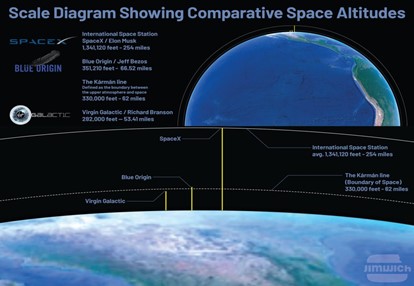ALL ABOARD! AMERICAN CIVILIANS GO TO SPACE
Wednesday, September 15th, marked a highpoint in space history with the launch of the first all-civilian mission to orbit, Elon Musk’s SpaceX Inspiration4. This four-man mission—led by commander Jared Isaacman, who paid an estimated $200 million to fund the trip—is on a three-day orbital flight 360 miles above Earth, roughly 100 miles higher than the International Space Station and the Hubble telescope. The voyage will conclude in the Atlantic Ocean early Sunday morning. This voyage represents a new type of space tourism and concludes an incredible summer for American innovation in space. On July 20, Jeff Bezos launched himself along with a crew of three aboard Blue Origin’s New Shepard past the Kármán line – the internationally recognized boundary of space roughly 62 miles above earth. Just days earlier on July 11, Richard Branson made the first tourist space flight in history on a fixed wing space plane named Unity, reaching about 53 miles above Earth. These three space pioneers are paving the way for a new frontier where space can and will be accessible to all of us.

These accomplishments may not have been possible without the leadership of the Trump-Pence Administration in reestablishing the United States National Space Council in 2017 which then led to President Trump signing the White House Space Policy Directive 1 on December 2017 to reinvigorate America’s Human Space Exploration Program. This program put a greater emphasis on partnerships between the private sector and the U.S. government to support the budding commercial space industry and diversifying America’s space efforts instead of relying entirely on NASA. Additionally, the delivery of the America First National Space Strategy and the signing of Space Policy Directive 2, which called upon the Executive Branch to review existing regulations to ensure that they were not harmful, unnecessary, or conflicting, took steps toward removing government impediments to economic growth and helping encourage U.S. space commerce leadership. These efforts along with a dozen other actions (See more here: The National Space Council Four Years Later - Top Ten Achievements that Benefitted America) would ultimately boost the space industry by almost $100 billion overall during the past 4 years, and after this year’s achievements, the American space economy could lead to trillions more in the years to come.
Just over a hundred years ago, PE Fansler sought to drastically reduce the day-and-a-half journey it took to travel between St Petersburg and Tampa, Florida, a 23-mile stretch. In January 1914, Fansler bought new flying boats built by American aviation pioneer Thomas Benoist and, for the cost of $9,300 per ticket in today’s dollars, completed the first-ever commercial flight in just over 20 minutes. While Fansler’s feat may have felt like a modest achievement at the time, it sparked a new industry that has since resulted in millions of people flying every day. With SpaceX, Blue Origin, and Virgin Galactic’s amazing milestones this year in space tourism, we again are headed toward a new age of innovation in space flight. These flights have proven that the risks to human life and the cost to the American taxpayer are drastically decreasing with the private sector now officially empowered to embark on these missions without the excessive encumbrances of government intervention. America should recognize and celebrate these truly incredible acts of courage, financial and physical sacrifice, and risk-taking that took the likes of Elon Musk, Jeff Bezos, and Sir Richard Branson to collectively achieve these barriers and allow humanity to enter into this new era of space travel. Because of them, it’s no longer a fantasy to imagine a world where it’s possible to enjoy a trip to space for a price that’s not astronomical, to fly from New York to Sydney in under 30 minutes, to work in space laboratories, to mine asteroids, or make humanity a multi-planetary species. These advancements are only a few years away and are happening now, here in America.
Steven M. Smith serves as AFPI’s Chief of Staff and Director of the Center for New Frontiers. Smith recently served as a Special Assistant to the President and Chief of Staff to the Director of the White House Office of American Innovation and the Domestic Policy Council, which served as a member on the National Space Council.